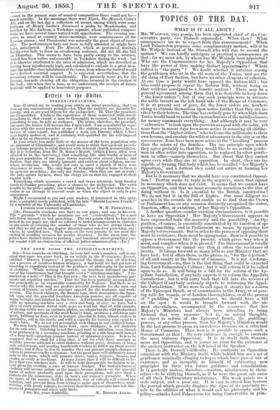THE LOOM versus THE STITCHING - MACHINE.
SIG—Your remarks on stitching, in your last week's number, call to my mind that some ten years back, in an article in the Westminster Review, entitled "Human Progress," I propounded the theory that all stitching was a process of needless human drudgery, a bad habit we had got into of resorting to expedients instead of the guidance of philosophy in the matter of clothing. While writing the article, an American informed me that one of his countrymen had just brought over a "stitching-machine." I re- marked in a note—" This is the first step ; the next is to manufacture gar- ments not requiring stitches." That too has been partially accomplished, but principally as an exportable commodity for Negroes. )3ut there is no reason why the loom may not produce graceful garments for the men and women of leisure, as well as succinct apparel for the workman and work- woman. The Greek chlsmys, the Roman toga, their descendants the Span- ish caps, and the graceful Southern American poncho, are all capable of being wrought and finished in the loom. A Patagonian Red Indian squaw, with no spinning-machine save a stick and lump of clay, no loom but a piece of turfy ground dotted with pegs, no wool but that of wild animals, no dyeing-kettle save an earthern pipkin, no colours but the wild productions of nature, and mordants of the most homely kind, produces a stitchless gar- ment, brilliant in dyes, even in texture, graceful in form1 almost endless in +durability, soft to the touch, and with a capacity for turning rain equal to a duck's back. We do not yet accomplish such things in our civilized looms. We may fairly assume that mere work, mere drudgery, is not desirable for its own sake. Stitching is not the exact road to salvation, even though it be performed by a secondary machine, grinding at a stitching-mill instead of a flour-mill—grinding-jennies instead of spinning-jennies. It is to be supposed that we shall for a long time, if not for ever, have amongst us wealthy persons addicted to outr6 fashions without grace, desirous of being only conspicuous, and needing handicraft workers to follow up those eccen- tricities; and if they be few in number they can procure enough changes of toilers to prevent cruelty to humans : but the great mass will ultimately resort only to the loom, which will prepare shirts, tunics, trousers, dresses, and cloaks, as easily as stockings. .tit some future time it will be difficult to be- lieve that ever stitehers were, It will be held disreputable for fashion to in- vent plans for creating a race of human drudges. The manufacturers of clothing will become artists as the masses become refined—as the graceful forms of nature gradually steal upon their perceptions, and give them a distaste for the monstrous, alike in men's and women's garments. When the tastes of the masses shall be educated, fear of ridicule will control the tasess, and prevent them from trying to make apes of themselves, while striving, with gaudy colours, to convert their liveried"servanta into bad like- nesses of iparaquets and other ugly birds. I am, Sir, yours faithfully, W. BRIDGES ADAMS.


























 Previous page
Previous page